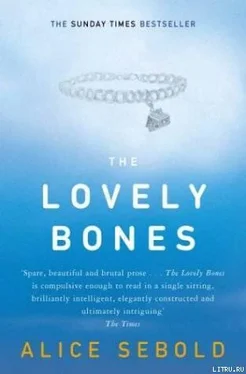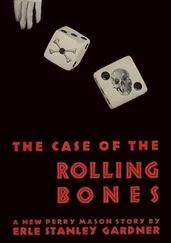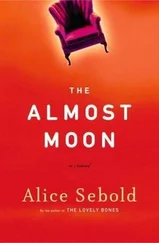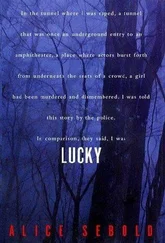“In the past, I’ve done it inside, but I tried to do it outside this year. We were married in the winter. Until the snow picked up, I thought it would work.”
“Where inside?”
“The basement. I can show you if you want. I have all of Leah’s things down there still.”
But Len did not go further.
“I’ve intruded enough,” he said. “I just wanted to sweep the neighborhood a second time.”
“How’s your investigation coming?” Mr. Harvey asked. “Are you finding anything?”
Len never liked questions like this, though he supposed they were the right of the people whose lives he was invading.
“Sometimes I think clues find their way in good time,” he said. “If they want to be found, that is.” It was cryptic, sort of a Confucius-says answer, but it worked on almost every civilian.
“Have you talked to the Ellis boy?” Mr. Harvey asked.
“We talked to the family.”
“He’s hurt some animals in the neighborhood, I hear.”
“He sounds like a bad kid, I grant you,” said Len, “but he was working in the mall at the time.”
“Witnesses?”
“Yes.”
“That’s my only idea,” Mr. Harvey said. “I wish I could do more.”
Len felt him to be sincere.
“He’s certainly a bit tweaked at an angle,” Len said when he called my father, “but I have nothing on him.”
“What did he say about the tent?”
“That he built it for Leah, his wife.”
“I remember Mrs. Stead told Abigail his wife’s name was Sophie,” my father said.
Len checked his notes. “No, Leah. I wrote it down.”
My father doubted himself. Where had he gotten the name Sophie? He was sure he had heard it too, but that was years ago, at a block party, where the names of children and wives flew about like confetti between the stories people told to be neighborly and the introductions to infants and strangers too vague to remember the following day.
He did remember that Mr. Harvey had not come to the block party. He had never come to any of them. This went to his strangeness by the standards of many in the neighborhood but not by my father’s own standards. He had never felt completely comfortable at these forced efforts of conviviality himself.
My father wrote “Leah?” in his book. Then he wrote, “Sophie?” Though unaware of it, he had begun a list of the dead.
On Christmas Day, my family would have been more comfortable in heaven. Christmas was largely ignored in my heaven. Some people dressed all in white and pretended they were snowflakes, but other than that, nothing.
That Christmas, Samuel Heckler came to our house on an unexpected visit. He was not dressed like a snowflake. He wore his older brother’s leather jacket and a pair of ill-fitting army fatigues.
My brother was in the front room with his toys. My mother blessed the fact that she had gone early to buy his gifts. Lindsey got gloves and cherry-flavored lip gloss. My father got five white handkerchiefs that she’d ordered months ago in the mail. Save Buckley, no one wanted anything anyway. In the days before Christmas the lights on the tree were not plugged in. Only the candle that my father kept in the window of his den burned. He lit it after dark, but my mother, sister, and brother had stopped leaving the house after four o’clock. Only I saw it.
“There’s a man outside!” my brother shouted. He’d been playing Skyscraper and it had yet to collapse. “He’s got a suitcase.”
My mother left her eggnog in the kitchen and came to the front of the house. Lindsey was suffering the mandatory presence in the family room that all holidays required. She and my father played Monopoly, ignoring the more brutal squares for each other’s sake. There was no Luxury Tax, and a bad Chance wasn’t recognized.
In the front hall my mother pressed her hands down along her skirt. She placed Buckley in front of her and put her arms on his shoulders.
“Wait for the man to knock,” she said.
“Maybe it’s Reverend Strick,” my father said to Lindsey, collecting his fifteen dollars for winning second prize in a beauty contest.
“For Susie’s sake, I hope not,” Lindsey ventured.
My father held on to it, on to my sister saying my name. She rolled doubles and moved to Marvin Gardens.
“That’s twenty-four dollars,” my father said, “but I’ll take ten.”
“Lindsey,” my mother called. “It’s a visitor for you.”
My father watched my sister get up and leave the room. We both did. I sat with my father then. I was the ghost on the board. He stared at the old shoe lying on its side in the box. If only I could have lifted it up, made it hop from Boardwalk to Baltic, where I always claimed the better people lived. “That’s because you’re a purple freak,” Lindsey would say. My father would say, “I’m proud I didn’t raise a snob.”
“Railroads, Susie,” he said. “You always liked owning those railroads.”
To accentuate his widow’s peak and tame his cowlick, Samuel Heckler insisted on combing his hair straight back. This made him look, at thirteen and dressed in black leather, like an adolescent vampire.
“Merry Christmas, Lindsey,” he said to my sister, and held out a small box wrapped in blue paper.
I could see it happen: Lindsey’s body began to knot. She was working hard keeping everyone out, everyone, but she found Samuel Heckler cute. Her heart, like an ingredient in a recipe, was reduced, and regardless of my death she was thirteen, he was cute, and he had visited her on Christmas Day.
“I heard you made gifted,” he said to her, because no one was talking. “Me too.”
My mother remembered then, and she switched on her autopilot hostess. “Would you like to come sit?” she managed. “I have some eggnog in the kitchen.”
“That would be wonderful,” Samuel Heckler said and, to Lindsey’s amazement and mine, offered my sister his arm.
“What’s that?” asked Buckley, trailing behind and pointing to what he thought was a suitcase.
“An alto,” Samuel Heckler said.
“What?” asked Buckley.
Lindsey spoke then. “Samuel plays the alto saxophone.”
“Barely,” Samuel said.
My brother did not ask what a saxophone was. He knew what Lindsey was being. She was being what I called snooty-wooty, as in “Buckley, don’t worry, Lindsey’s being snooty-wooty.” Usually I’d tickle him as I said the word, sometimes burrowing into his stomach with my head, butting him and saying “snooty-wooty” over and over until his trills of laughter flowed down over me.
Buckley followed the three of them into the kitchen and asked, as he had at least once a day, “Where’s Susie?”
They were silent. Samuel looked at Lindsey.
“Buckley,” my father called from the adjoining room, “come play Monopoly with me.”
My brother had never been invited to play Monopoly. Everyone said he was too young, but this was the magic of Christmas. He rushed into the family room, and my father picked him up and sat him on his lap.
“See this shoe?” my father said.
Buckley nodded his head.
“I want you to listen to everything I say about it, okay?”
“Susie?” my brother asked, somehow connecting the two.
“Yes, I’m going to tell you where Susie is.”
I began to cry up in heaven. What else was there for me to do?
“This shoe was the piece Susie played Monopoly with,” he said. “I play with the car or sometimes the wheelbarrow. Lindsey plays with the iron, and when your mother plays, she likes the cannon.”
“Is that a dog?”
“Yes, that’s a Scottie.”
“Mine!”
“Okay,” my father said. He was patient. He had found a way to explain it. He held his son in his lap, and as he spoke, he felt Buckley’s small body on his knee – the very human, very warm, very alive weight of it. It comforted him. “The Scottie will be your piece from now on. Which piece is Susie’s again?”
Читать дальше












